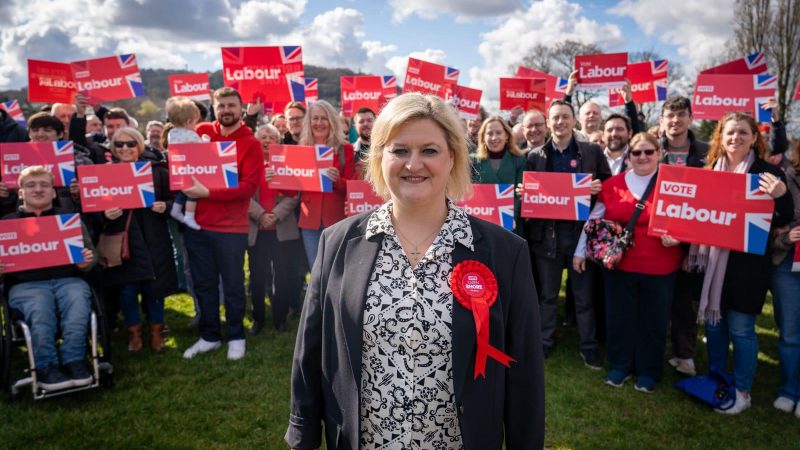
Finger-pointing has already begun following Labour’s painfully close defeat to Reform UK in the Runcorn and Helsby by-election, with party figures blaming everything from mid-term blues to benefit cuts, disillusion with the Tories to immigration policies.
A Labour spokesperson and ministers suggested it showed voters want the government to “move faster” on its existing key policies. Meanwhile pollsters noted party’s success in squeezing their rivals was key, with Reform seemingly eating up more of the Tory vote than Labour managed of the Lib Dem and Green vote at the last election.
The result saw Sarah Pochin beat Labour’s Karen Shore by just six votes, the closest result in a by-election in modern history.
Reform UK has heralded the result, with a party source crowing to reporters: “We said we were parking our tanks on Labour’s lawn and now we have taken one of their safest seats. Nearly every Labour seat is now in play.”
It comes as Nigel Farage’s party also pick up council seats across England from both the Conservatives and Labour, as well as making significant in-roads in mayoral elections.
READ MORE: Runcorn defeat: Results breakdown, analysis and reaction to knife-edge loss
Party blames mid-term blues, Amesbury and voter anger at Tories
A Labour Party spokesperson made the predictable but understandable point that by-elections are “always difficult for the party in government”. Close election watcher and Keir Starmer loyalist Luke Akehurst made a similar point writing for us in the lead-up to this contest and local elections that Labour has “never made net gains while it is in power nationally”.
The party spokesperson added that the circumstances that led to the contest in Runcorn and Helsby – an obvious nod to the recent conviction of Mike Amesbury for assault – made things harder for the party.
He also said voters were “rightly furious with the state of the country after 14 years of failure and clearly expect the government to move faster with the Plan for Change”.
Scroll to keep reading the story below….
 Email us your views on why Labour lost to [email protected]
Email us your views on why Labour lost to [email protected]
Pollster More in Common’s Luke Tryl suggested that the swing to Reform in Runcorn, as well as in council and mayoral elections, reflects “deep disillusionment with the status quo, anger at 14 years of Tories and frustration with the start of the Labour government”.
He said voters who are unsure about Farage and Reform have felt “they may as well roll the dice to get the change they keep asking for.”
Subscribe here to our daily newsletter roundup of all things Labour – and follow us on Bluesky, WhatsApp, Threads, X or Facebook.
On the ground among canvassers and party activists, there was criticism about unpopular policies implemented by the government in Westminster, which they claimed has had a knock-on effect on the doorstep.
BBC chief political correspondent Henry Zeffman said shortly after the result: “I was talking to one [Labour] campaigner who was leaving – they said to me on every door, it was the same story: winter fuel and benefit cuts.”
This is something echoed by Labour’s re-elected mayor of Doncaster, Roz Jones, who claimed the Prime Minister was getting it wrong on welfare, winter fuel and National Insurance. Jones came within 700 votes of losing to Reform in her election.
READ MORE: Council-by-council Labour gains and losses – and its position in each mayor race
She told the BBC: “I think national government needs to look and see what people are saying. I wrote as soon as the winter fuel allowance was actually mooted, and I said it was wrong, and therefore I stepped in immediately and used our household support fund to ensure no-one in Doncaster went cold during the winter.
“I think the results here tonight demonstrate that they need to be listening to the man, woman and businesses on the street and actually deliver for the people, with the people.”
Immediate warnings from the left
Outspoken new Labour MP Brian Leishman said that the result in Runcorn and Helsby should be a warning for the party to change course.
In a post on social media, the MP for Alloa and Grangemouth said: “People voted for real change last July and an end to austerity. The first ten months haven’t been good enough or what the people want and if we don’t improve people’s living standards then the next government will be an extreme right wing one.”
Kim Johnson and Richard Burgon also offered similar warnings, with Johnson taking to social media to say: “Voters want change – and if we don’t offer it with bold, hopeful policies that rebuild trust, the far-right will.”
Government cuts resonate more than government wins
Matthew McGregor, CEO of campaign group 38 Degrees, highlighted new focus group work suggesting the cost of living remained key to voters nationally.
“The harsh reality is that some of the government decisions with the biggest breakthrough with voters are policies which actively hurt people in the pocket….Even where the government has pushed through good things that have the potential to help people’s material circumstances, the lack of fight for those issues means that cut through hasn’t been there.”
READ MORE: ‘Results so far say one thing: voters think change isn’t coming fast enough’
Some will expect the government to seek to show a more hardline stance on immigration coming out of this contest, given its centrality to Reform’s messaging and conspicuous government announcements on immigration earlier in the week.
Many MPs worried about Reform are likely to both feel more worried but also vindicated in pushing for a hardline stance on issues like migration.
But Momentum co-chair Sasha das Gupta appeared to suggest it may actually have put off some voters. She accused the party under Starmer’s leadership of “continuing austerity, pandering to the far-right and failing to offer real change”.
She said: “The Labour leadership risks handing the country to the likes of Nigel Farage. It’s time for MPs, councillors, party members and the wider labour movement to speak out, oppose attacks on living standards, and demand the government change course by offering real Labour values and standing up for working class communities.”
Results on the night
- West of England mayor: Results unpacked as Labour edges Reform and Greens
- Doncaster mayor: Labour holds off Reform by 700 votes
- Runcorn: Recount ordered with ‘four votes in it’
- Labour North Tyneside mayor holes on but vote halves as Reform come close
Reform squeezed the right more than Labour squeezed the left
Pollster Rob Ford wrote earlier this week that a Reform win would reflect two factors – fragmentation and organisation.
“The Conservatives polled 16% in Runcorn and Helsby in 2024, only narrowly behind Reform. These should in theory be low hanging fruit for Farage, given Conservatives are typically more Reform curious than Labour voters. A tactical squeeze of third-placed Tories would make a Reform win a lot easier and worry other Labour MPs who currently benefit from divided right wing opponents.”
He predicted fragmentation would matter on the left, too, noting nearly one voter in 10 backed the Lib Dems or Greens in Runcorn last year. The same pattern was evident this year. Voters faced a “conflict between their desire to express their unhappiness with the direction of the Labour government and their desire to avoid being represented by a Reform MP” – and for many of that important voter bloc, the first appears to have won out.
Neal Lawson of campaign group Compass said: “Labour need to understand that if people want Reform’s policies then they will vote for Reform. What should terrify Labour strategists in Runcorn is that the Green vote went up – even though Green voters knew this might let Reform in.”
Ford also predicted that the strength of local party organisation “may help tip the balance”, a point only underlined by the fine margins. While more than 150 Labour MPs visited the seat, Keir Starmer did not – but there are mixed views on whether a visit would have helped or hindered the campaign.
Read more on the 2025 local elections:
Results on the day
- Council by council results: Labour gains and losses – and its position in each mayor race
- Runcorn defeat: Results breakdown, analysis and reaction to knife-edge loss
- West of England mayor: Results unpacked as Labour edges Reform and Greens
- Doncaster mayor: Labour holds off Reform by 700 votes
- Northumberland results breakdown as Labour ends third in council it once ran
- Labour North Tyneside mayor holds on but vote halves as Reform come close
Analysis and what to expect
- Runcorn blame game begins – why did Labour lose?
- ‘Labour has lost in Runcorn – here are the eight things the party should do now‘
- MPs who could lose their seat on Runcorn by-election swing to Reform
- ‘Results so far say one thing: voters think change isn’t coming fast enough’
- Three ways to measure Labour’s success tonight
- Expert predicts ‘bad night’ with no net Labour gains
- ‘Uxbridgitis: If election results are grim, let’s not learn the wrong lessons again’
- Where’s Keir? PM barely features in Labour party election broadcasts for the locals
- The meme elections: Labour’s social media pivot to take fight to Farage
LabourList’s on-the-ground reports from the campaign
- Hull and East Yorkshire: Labour candidate spars with Reform’s boxing star in UK’s most disillusioned city
- Cambridgeshire & Peterborough Nik Johnson on why he’s standing down and Anna Smith on knife-edge Labour-Tory fight to replace him
- West of England: Tory and Green threats, Dan Norris and low voter awareness
- Lancashire: Long shadow of Gaza looms over key battleground
Inside the Runcorn campaign
- Mood on the doorstep: Labour’s last push for Tory voters to keep out Reform
- At least 150 Labour MPs visit – but Keir Starmer ain’t one
- Karen Shore interview: Labour candidate on Reform, the NHS and closing asylum hotels
- Runcorn poll: One in ten Labour voters expected to back Reform
- SHARE: If you have anything to share that we should be looking into or publishing about this story – or any other topic involving Labour– contact us (strictly anonymously if you wish) at [email protected].
- SUBSCRIBE: Sign up to LabourList’s morning email here for the best briefing on everything Labour, every weekday morning.
- DONATE: If you value our work, please chip in a few pounds a week and become one of our supporters, helping sustain and expand our coverage.
- PARTNER: If you or your organisation might be interested in partnering with us on sponsored events or projects, email [email protected].
- ADVERTISE: If your organisation would like to advertise or run sponsored pieces on LabourList‘s daily newsletter or website, contact our exclusive ad partners Total Politics at [email protected].




More from LabourList
Government abandons plans to delay 30 local elections in England
‘The cost of living crisis is still Britain’s defining political challenge’
‘Nurses are finally getting the recognition they deserve’